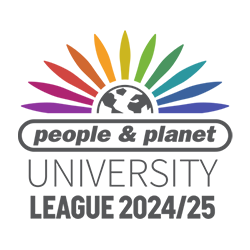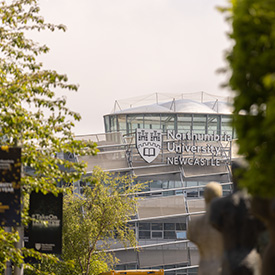-
Study
-
Undergraduate
- Search for a Course
- Undergraduate Open Day & Events
- Application Guides
- Northumbria University UCAS Exhibitions
- Foundation Years
- Undergraduate Fees & Funding
- School & College Outreach
- Continuing Professional Development
-
Postgraduate
- Postgraduate Study Degree
- Postgraduate Research Degrees
- Postgraduate Open Days and Events
- Postgraduate Fees & Funding
- Flexible Learning
- Thinking about a Masters?
- Continuing Professional Development
- Change Direction
-
Student Life
- The Hub - Student Blog
- Accommodation
- Life in Newcastle
- Support for Students
- Careers
- Information for Parents
- Students' Union
- Northumbria Sport
- Be Part of It
-
-
International
International
Northumbria’s global footprint touches every continent across the world, through our global partnerships across 17 institutions in 10 countries, to our 277,000 strong alumni community and 150 recruitment partners – we prepare our students for the challenges of tomorrow. Discover more about how to join Northumbria’s global family or our partnerships.
View our Global Footprint-
Applying to Northumbria
- European Union
- Our London Campus
- Northumbria Pathway
- International Events
- Entry Requirements and Country Representatives
- Global Offices
-
Northumbria Language Centre
- Faculty Requirements
- Acceptable English Requirements
- Pre-sessional English Language and Study Skills
- Academic Language Skills Programmes (ALS)
-
International Fees, Funding & Scholarships
- International Undergraduate Fees
- International Undergraduate Funding
- International Masters Fees
- International Masters Funding
- International Postgraduate Research Fees
- International Postgraduate Research Funding
- International Money Matters
-
Life at Northumbria
- International student support
- Careers
-
International Mobility
- Current Northumbria Students
- Incoming Exchange Students
-
-
Business
Business
The world is changing faster than ever before. The future is there to be won by organisations who find ways to turn today's possibilities into tomorrows competitive edge. In a connected world, collaboration can be the key to success.
More on our Business Services -
Research
Research
Northumbria is a research-rich, business-focused, professional university with a global reputation for academic quality. We conduct ground-breaking research that is responsive to the science & technology, health & well being, economic and social and arts & cultural needs for the communities
Discover more about our Research -
About Us
-
About Northumbria
- Our Strategy
- Our Staff
- Place and Partnerships
- Student Profiles
- Alumni Profiles
- Leadership & Governance
- Academic Departments
- University Services
- History of Northumbria
- Contact us
- Online Shop
-
-
Alumni
Alumni
Northumbria University is renowned for the calibre of its business-ready graduates. Our alumni network has over 246,000 graduates based in 178 countries worldwide in a range of sectors, our alumni are making a real impact on the world.
Our Alumni - Work For Us
What will I learn on this module?
Group dynamics are the influential actions, processes, and changes that occur within and between groups of people. Groups come in all shapes and sizes, and their functions vary. To understand groups and their dynamics, you must understand how people interact and function while working together in formalised organisational contexts. This module aims to unite and contextualise theories from psychology and the social sciences associated with team dynamics with theories from management and organisation sciences related to groups, teams, and management processes. The overarching goal is to equip and empower you with the knowledge, skills, and abilities to structure, participate in, and lead real, virtual, and hybrid project-orientated teams.
How will I learn on this module?
This module will adopt an integrated approach to learning and teaching, including a formal scheduled teaching programme and a constructively aligned learning path of tutor-directed learning and independent study. During in-class instruction, tutors will introduce you to selected concepts and theories about how groups operate in organisations. You will also study specific chapters of the essential reading textbook, complete applied small-group tasks during seminars, explore case studies, and watch online video presentations. Your learning will also be facilitated using digital learning materials presented on the university’s technologically enhanced learning (TEL) platforms, including Panopto video recordings of the lectures for you to watch afterwards. Off-campus students will complete tutor-directed tasks with a small group of their off-campus peers in place of the seminars, making use of the collaborative tools in the university’s TEL platforms.
How will I be supported academically on this module?
Tutors will provide guidance and 1-2-1 support (where possible) or use interactive asynchronous online peer support forums on the university’s virtual learning environment (VLE) to support you in your studies. Tutors will use directed learning activities, e.g., required reading from selected chapters of the essential reading textbook. You will supplement this tutor-directed support with independent study.
What will I be expected to read on this module?
All modules at Northumbria include a range of reading materials that students are expected to engage with. Online reading lists (provided after enrolment) give you access to your reading material for your modules. The Library works in partnership with your module tutors to ensure you have access to the material that you need.
What will I be expected to achieve?
Knowledge & Understanding:
1. Define and evaluate selected theories and concepts associated with the main characteristics and processes of teams, the issues facing teams, and the organisational context of teams.
2. Critically appraise selected theories and techniques associated with the groups and teams in an organisation, organisational structures, and management processes.
Intellectual / Professional Skills & Abilities:
3. Empowered with the knowledge, skills, and abilities to structure, participate in, and effectively lead real, virtual, and hybrid project-orientated teams.
4. Critically review the extant literature on team dynamics, management, and organisational behaviour, and engage with what others have written through evaluative discourse.
Personal Values Attributes (Global / Cultural awareness, Ethics, Curiosity) (PVA):
5. Develop and exhibit a Northumbria University postgraduate student’s professional ethics characteristics. You will have the opportunity to reflect on how these relate to your values and thus review your professional development plan.
How will I be assessed?
Formative Assessment
Tutors will assess you in a formative manner to help build your confidence and highlight any misunderstandings you may have about the theoretical and professional concepts presented in the module. Tutors will verbally give you constructive feedback during formally scheduled teaching sessions or digitally using the university’s virtual learning environment (VLE). Your formative feedback aims to help you learn and prepare for the submission of your summative assessments.
Summative Assessment
Tutors will assess you in a summative manner with two pieces of inter-related coursework: Coursework 001 and Coursework 002. Tutors will use Coursework 002 to evaluate your ability to satisfy all the module’s learning outcomes. You will use the university’s VLE to submit Coursework 002. Tutors will use digital feedback tools embedded within the VLE to issue your mark and feedback for Coursework 002. Coursework 001 involves the peer assessment of draft Coursework 002. Instead of the tutors, two of your peers will use digital feedback tools embedded within the VLE to provide you with formative feedback for Coursework 001. You will also provide constructive feedback on two of your peers’ drafts of Coursework 001. Tutors will summatively assess your participation in the peer assessment process to issue your mark for Coursework 001 using the VLE’s embedded digital feedback tools.
Pre-requisite(s)
NA
Co-requisite(s)
NA
Module abstract
Of all the variables that contribute to the success or failure of projects, the project team is the most neglected one and, therefore, needs the most attention. This module aims to provide a clear and concise overview of the key concepts and theories of project, social, and organisation psychology about effective project team dynamics. Of equal importance, the module will also explore the essential concepts and theories associated with management and organisational behaviour, which influence people and project-orientated teamwork. Grounded in the social, management, and organisation sciences but with an underlying practice-based focus on effective teamwork, the module will enable you to understand, participate in, and lead real, virtual, and hybrid project-orientated teams.
Course info
Credits 20
Level of Study Postgraduate
Mode of Study 2 years Full Time (with Advanced Practice in the second year)
2 other options available
Department Architecture and Built Environment
Location City Campus, Northumbria University
City Newcastle
Start January 2025
All information is accurate at the time of sharing.
Full time Courses are primarily delivered via on-campus face to face learning but could include elements of online learning. Most courses run as planned and as promoted on our website and via our marketing materials, but if there are any substantial changes (as determined by the Competition and Markets Authority) to a course or there is the potential that course may be withdrawn, we will notify all affected applicants as soon as possible with advice and guidance regarding their options. It is also important to be aware that optional modules listed on course pages may be subject to change depending on uptake numbers each year.
Contact time is subject to increase or decrease in line with possible restrictions imposed by the government or the University in the interest of maintaining the health and safety and wellbeing of students, staff, and visitors if this is deemed necessary in future.
Useful Links
Find out about our distinctive approach at
www.northumbria.ac.uk/exp
Admissions Terms and Conditions
northumbria.ac.uk/terms
Fees and Funding
northumbria.ac.uk/fees
Admissions Policy
northumbria.ac.uk/adpolicy
Admissions Complaints Policy
northumbria.ac.uk/complaints













